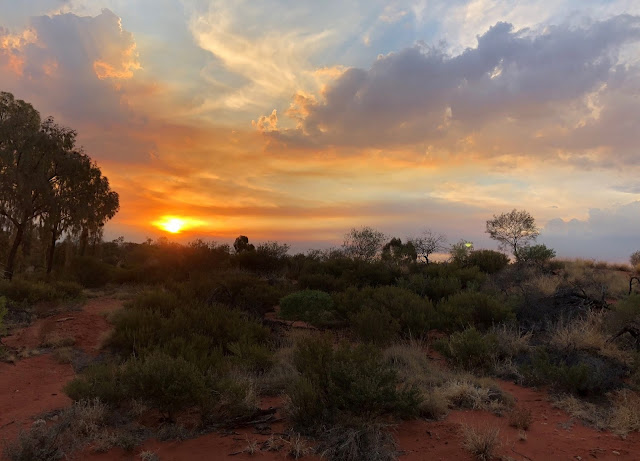Why you should go
Uluru
is not just a rock in the middle of nowhere, it is magical – especially when
seen at sunrise and sunset.
Uluru – brief history
Sacred to the Anangu, the indigenous people who have inhabited the area for about 30,000 years, this huge red rock was formed over 6oo million years ago. It is said to be the place occupied by the spirits of their ancestors.
Sacred to the Anangu, the indigenous people who have inhabited the area for about 30,000 years, this huge red rock was formed over 6oo million years ago. It is said to be the place occupied by the spirits of their ancestors.
In 1873, an English explorer William Gosse discovered the
rock. It was named after Australian politician, Sir Henry Ayers. Today the
official title is Uluru Ayers Rock.
 |
| Uluru at sunrise |
How did it form?
The rock monolith dates back millions of years, to the time that the Australian continent was formed. In a nutshell, over thousands of years of mountain building and erosion, Uluru and its neighbour Kata Tjuta are the remains of hard mountain rock after the softer areas eroded.
The rock monolith dates back millions of years, to the time that the Australian continent was formed. In a nutshell, over thousands of years of mountain building and erosion, Uluru and its neighbour Kata Tjuta are the remains of hard mountain rock after the softer areas eroded.
Size matters
The rock is approximately 3.6km (2.2 miles) long and 348m (1,142 feet) tall. Two-thirds of the rock is believed to be underground.
The rock is approximately 3.6km (2.2 miles) long and 348m (1,142 feet) tall. Two-thirds of the rock is believed to be underground.
 |
| Kata Tjuta |
Seen at sunset and sunrise
As the sun begins to set, the colour of the rock starts to change from brown to a deep red to a glowing burning orange before turning dark. It is truly a magnificent experience. The reverse happens in the morning.
As the sun begins to set, the colour of the rock starts to change from brown to a deep red to a glowing burning orange before turning dark. It is truly a magnificent experience. The reverse happens in the morning.
The terrain is the draw of the Red Centre
Uluru is a Unesco World Heritage Site. Coupled with the Kata Tjuta (formerly called The Olgas), they are the highlights of the Uluru-Kata Tjuta National Park. Kata Tjuta, which roughly translates as many heads, is a collection of dome-shaped rock formations said to be over 600 million years old. Take a guided walk to experience this awesome sacred site close up. You can see rock art as well learning about the stories of the area.
Uluru is a Unesco World Heritage Site. Coupled with the Kata Tjuta (formerly called The Olgas), they are the highlights of the Uluru-Kata Tjuta National Park. Kata Tjuta, which roughly translates as many heads, is a collection of dome-shaped rock formations said to be over 600 million years old. Take a guided walk to experience this awesome sacred site close up. You can see rock art as well learning about the stories of the area.
 |
| The Red Centre at sunset |
Immerse yourself in Aboriginal culture
Most people who come to the Red Centre stay at the Ayers Rock Resort. Here you can discover more about the traditions of the Anangu tribe. You can also catch a dance show here. The Red Centre is a good place to buy Aboriginal art or handicrafts. Catch a didjeridoo performance or learn about the stars.
Most people who come to the Red Centre stay at the Ayers Rock Resort. Here you can discover more about the traditions of the Anangu tribe. You can also catch a dance show here. The Red Centre is a good place to buy Aboriginal art or handicrafts. Catch a didjeridoo performance or learn about the stars.
 |
| Living in the desesrt |
Discover the plants and animals that live in the desert
Despite this being harsh environment you will be surprised to see flowers and plants here as well as hear birds singing. You may also spot a red kangaroo or camel. Just be careful where you walk as you might bump into a snake.
Despite this being harsh environment you will be surprised to see flowers and plants here as well as hear birds singing. You may also spot a red kangaroo or camel. Just be careful where you walk as you might bump into a snake.
By Daralyn Danns
Getting there
Fly with Jetstar from Melbourne. For best fares visit jetstar.com
Fly with Jetstar from Melbourne. For best fares visit jetstar.com
Stay
Ayers Rock Resort provides a variety of accommodation
options from 5star to camping. For more information visit ayersrockresort.com.au





No comments:
Post a Comment